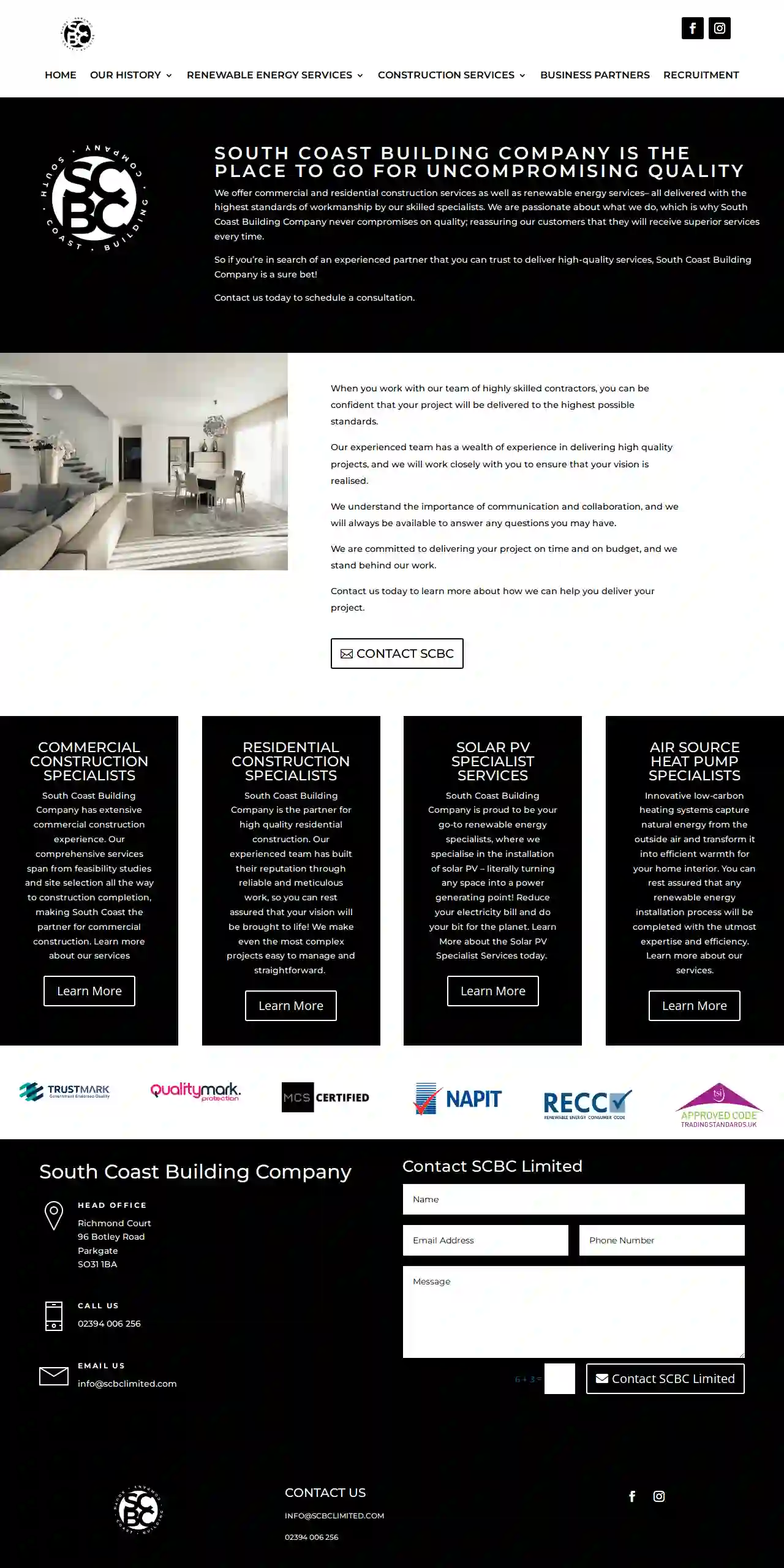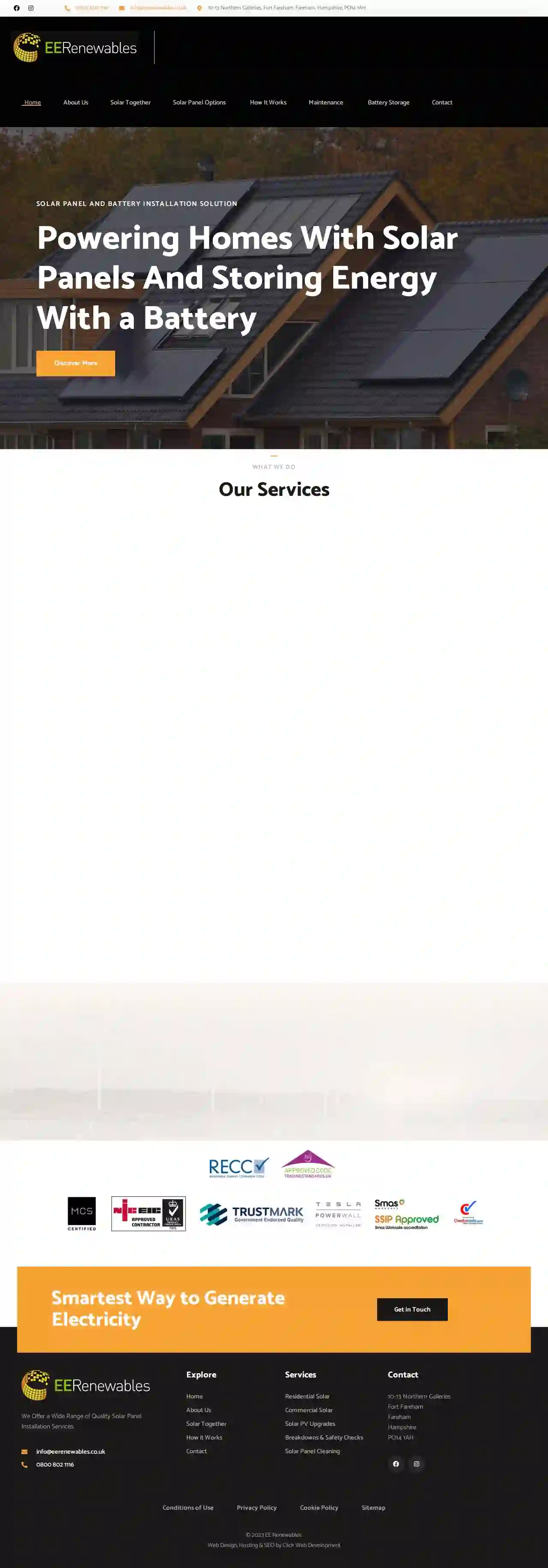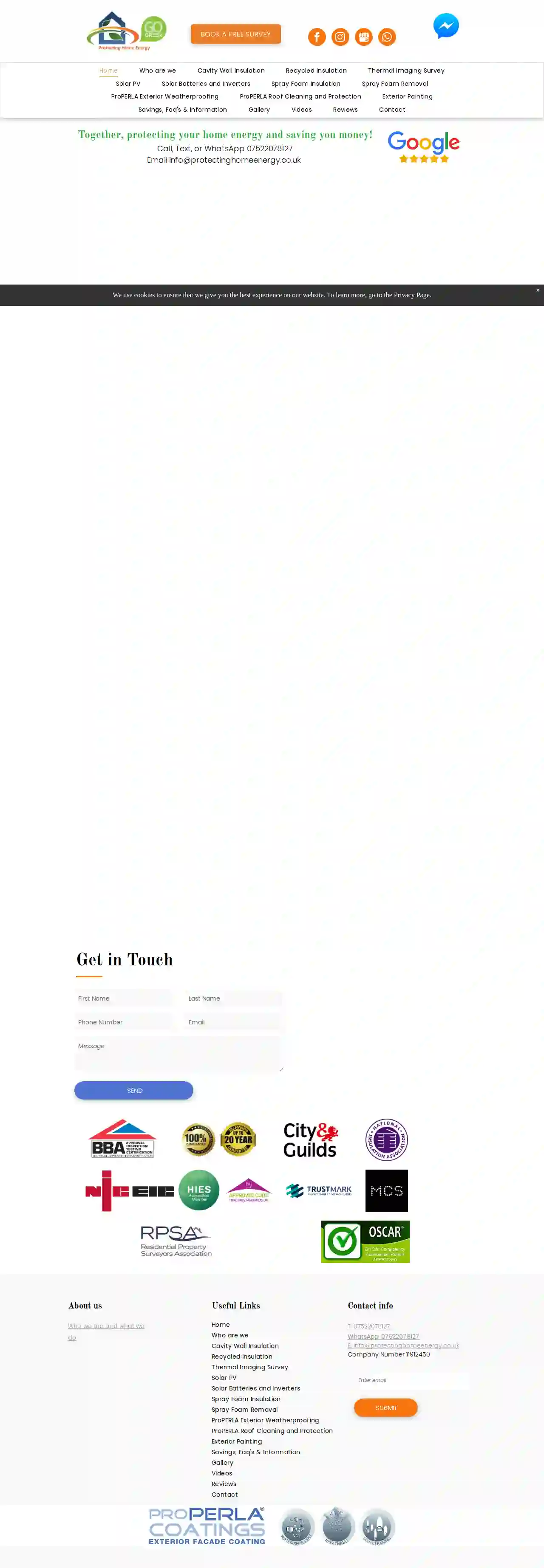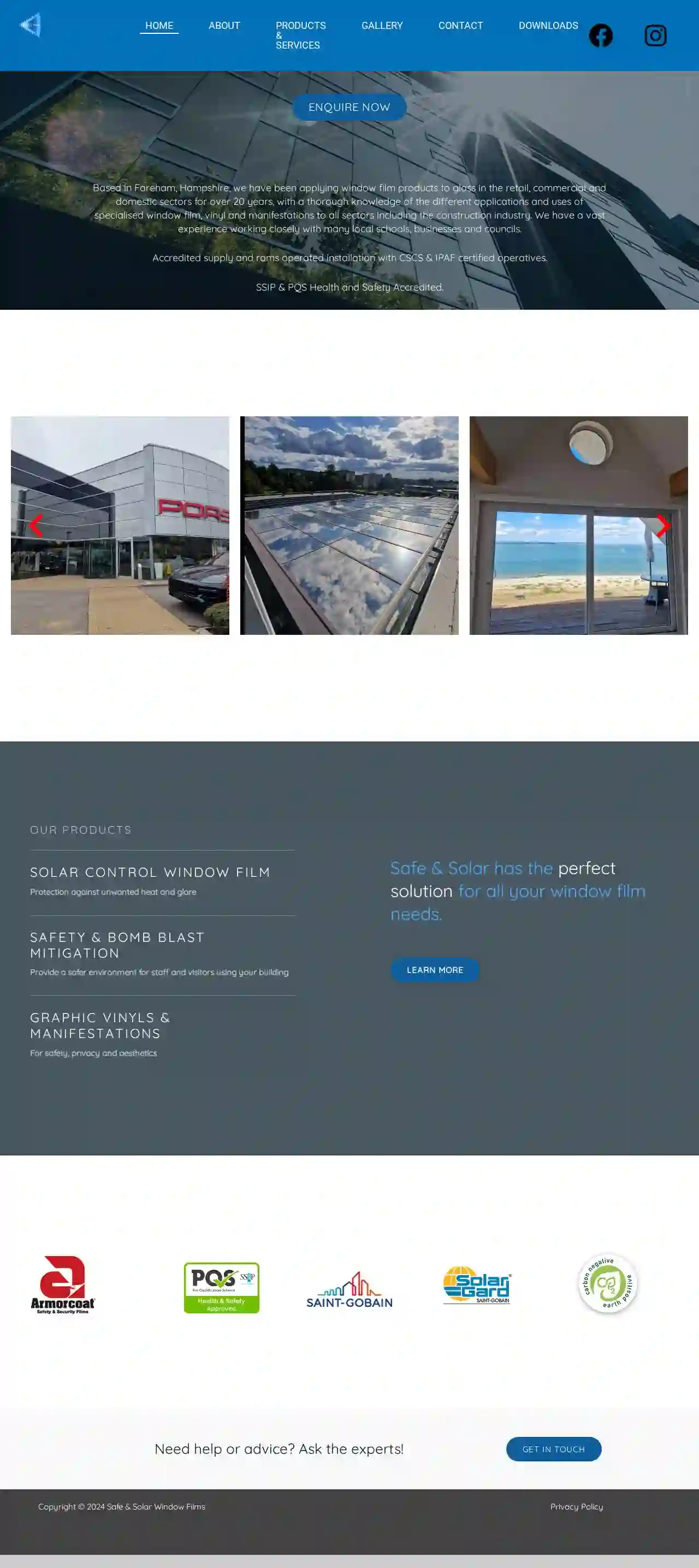Commercial Solar Installers Portsmouth
Best Commercial Solar Installer in Portsmouth
Get multiple Commercial Solar Companies quotes for your project today! Compare profiles, reviews, accreditations, portfolio, etc... and choose the best deal.

Solgen LTD
26 Lydney Road, Locks Heath, Southampton, SO31 6PY, GBSolgen LTD is an award-winning Community Interest Company dedicated to reducing CO2 and alleviating fuel poverty. We're a Community Interest Company committed to helping people and organisations save energy and money. With no shareholders to satisfy, we invest our profits into the communities we support – be it to establish sustainable energy projects, boost local employment in the energy saving sector, or offer sustainable solutions to the most vulnerable in society. Our business model is based on a holistic reflection combining interdisciplinary and intercultural expertise to provide the highest standards of engineering and consulting services. In the very core of its activities, there is a great experience in the field of cooling, exploitation of geothermal energy by heat pump technology, knowledge of solar and hydraulic systems, connections of economic, market, technical and energy factors at micro and macro level for successful implementation of projects. In the end, we always have a satisfied client, an efficient and sustainable system with minimal environmental impact. Our vision: In times when technology is rapidly developing and the needs for high quality energy are growing, an efficient model needs to be found to match these requirements with environmental protection, which will help solve the burning problems of mankind and fully fulfill the expectation of clients. Our mission is: Satisfied customer! Sustainable development, energy efficiency and independence!
- Services
- Why Us?
- Accreditations
- Gallery
Get Quote
South Coast Building Company Ltd
51 reviews96 Botley Road, Richmond Court, Parkgate, SO31 1BA, GBSouth Coast Building Company is the place to go for uncompromising quality. We offer commercial and residential construction services as well as renewable energy services– all delivered with the highest standards of workmanship by our skilled specialists. We are passionate about what we do, which is why South Coast Building Company never compromises on quality; reassuring our customers that they will receive superior services every time. So if you’re in search of an experienced partner that you can trust to deliver high-quality services, South Coast Building Company is a sure bet! Contact us today to schedule a consultation. When you work with our team of highly skilled contractors, you can be confident that your project will be delivered to the highest possible standards. Our experienced team has a wealth of experience in delivering high quality projects, and we will work closely with you to ensure that your vision is realised. We understand the importance of communication and collaboration, and we will always be available to answer any questions you may have. We are committed to delivering your project on time and on budget, and we stand behind our work. Contact us today to learn more about how we can help you deliver your project.
- Services
- Why Us?
- Accreditations
- Gallery
Get Quote
Greenward Energy
60 Coach Hill, Fareham, PO14 4DB, GBGreenward Energy offer residential and commercial customers affordable, reliable and sustainable service. With over 30 combined years of experience, Mark and Matt at Greenward Energy are not only business partners, they are also friends who share a love for all things electrical and eco-friendly. Based in Hampshire, where we live and work, we’re proud to serve our local community by contributing to a larger global movement towards sustainable living.
- Services
- Why Us?
- Accreditations
- Our Team
- Gallery
Get Quote
Send It Solar Ltd
56 reviews8a Queens Road, Portsmouth, PO2 7LZ, GBSend It Solar Ltd is a company of two electricians with over 20 years of combined experience installing solar panels in Hampshire, Surrey, and West Sussex. They are passionate about renewable energy and providing a fresh approach to the solar PV industry. As electricians, they handle the entire installation process, from site surveys to commissioning and after-care service. They work with a variety of clients, including architects, education facilities, councils, businesses, social enterprise groups, and community projects. Send It Solar is committed to making a significant, long-term difference to both energy bills and carbon footprints across the UK.
- Services
- Why Us?
- Accreditations
- Testimonials
- Gallery
Get Quote
Hampshire Solar Panels
53 reviewsBasingstoke, Lutyens Close, RG248AG, GBWelcome to Hampshire Solar Panels, your premier provider of eco-friendly and affordable electric solutions in Hampshire. With our residential solar panels, you'll be able to save money on solar energy and reduce your energy expenses. Our professional team is dedicated to providing high-quality, hard-wearing solar panels that come with a warranty. We supply durable, energy-efficient panels suitable for residents in Hampshire, ensuring a return on your investment. Our solar panels can help you save money on energy bills, establish energy independence, and reduce your home's environmental footprint. With our affordable pricing and quality work, you can trust Hampshire Solar Panels to provide you with the best solar energy solutions.
- Services
- Why Us?
- Gallery
Get Quote
EE Renewables Ltd
4.610 reviews10-13 Northern Galleries, Fort Fareham, Fareham, PO14 1AH, GBEE Renewables is a leading provider of solar panel installation solutions, dedicated to powering homes and businesses with clean, sustainable energy. With over 30 years of experience, we have a proven track record of delivering high-quality installations and exceptional customer service. Our team of expert engineers and advisors will guide you through every step of the process, from initial consultation to system commissioning. We offer a wide range of solar panel options to suit your individual needs and budget, ensuring optimal energy efficiency and long-term savings. Whether you're looking to reduce your carbon footprint, lower your energy bills, or increase the value of your property, EE Renewables is your trusted partner for all your solar energy needs. Our Home Performance Advisor will help you to: Determine the system size based on your property Understand which type of panel you would like installed on your property Know what the expected performance of the system might be Understand the financial impact of purchasing Solar Pv Identify any challenges with having a Solar Pv installation We are committed to providing our clients with the highest level of expertise, reliability, and customer satisfaction. Contact us today to learn more about how EE Renewables can help you harness the power of the sun.
- Services
- Why Us?
- Gallery
Get Quote
UK Greentech
54 reviewsLondon, UK, 123 London Road, SW1A 1AA, GBUK Green Tech is a leading provider of sustainable solutions for businesses and individuals. Our mission is to empower a greener future by offering innovative and eco-friendly products and services. With years of experience in the industry, our team of experts is dedicated to helping our clients reduce their carbon footprint and achieve their sustainability goals.
- Services
- Why Us?
- Accreditations
- Our Team
- Testimonials
Get Quote
Protecting Home Energy
4.911 reviewsPortsmouth, GBProtecting Home Energy is an independent family run experienced, professional company. We assist you in saving money and keeping your greatest asset, your home's energy efficient. This is through the use of our industry leading approved energy efficient products and qualified installation teams. Our Surveyor's carry out a FREE home energy survey and offer any recommendations should they be needed. We can also provide you with a FREE no obligation quotation. We offer a personal service in the comfort of your own home, over a cup of tea and a good chat. We offer competitive prices and honest advice. Check out our reviews to see what our customers have to say. Energy bills have increased and are continuing to rise. It is our job, purpose and mission to assess and reduce your home energy bills. We want to look after your home for years to come protecting it from damp and natures natural elements. We make your home more energy efficient whether that's being warmer in the winter or cooler in the summer! We offer a customer guarantee, hold all the relevant insurances and adhere to a 100% customer satisfaction policy. Our customers happiness from start to finish is our number one priority as is the standards and reputation of our company. Get in contact with us today if you feel you could benefit from a FREE survey and one of our surveyors will arrange a mutually convenient time. Together Protecting your Homes energy.
- Services
- Why Us?
- Gallery
Get Quote
Safe & Solar Window Films
517 reviewsPortsmouth, GBBased in Fareham, Hampshire, Safe & Solar Window Films has been applying window film products to glass in the retail, commercial and domestic sectors for over 20 years. We have a thorough knowledge of the different applications and uses of specialised window film, vinyl and manifestations to all sectors including the construction industry. We have a vast experience working closely with many local schools, businesses and councils. Safe & Solar is accredited for supply and rams operated installation with CSCS & IPAF certified operatives. We are also SSIP & PQS Health and Safety Accredited.
- Services
- Why Us?
- Gallery
Get Quote
Smart Energy
2.65 reviewsPortsmouth, GBCardinal Electrical is a team of highly qualified electricians with over 20 years of experience, working across the UK. Our experienced team of professional electricians can undertake all types of industrial electrical installations. We pride ourselves on being friendly and professional, delivering a high-quality service with minimal disruption to your routine. Our team will ensure that at the end of any project, your space is left clean and tidy.
- Services
- Why Us?
- Accreditations
- Testimonials
- Gallery
Get Quote
Over 3,485+ Solar Installers onboarded
Our solar contractors operate in Portsmouth and surroundings!
SolarCompaniesHub has curated and vetted the Best Solar Contractors arround Portsmouth. Find a top & trustworthy pro today.
Frequently Asked Questions About Commercial Solar Installations
- System Cost: The total upfront cost of the system, including panels, inverters, installation, permitting, and other expenses.
- Energy Savings: The estimated annual savings on your electricity bill based on the projected energy production of the system.
- Incentives and Rebates: Include any applicable tax credits, rebates, or other financial incentives that reduce the net cost of the system.
- Depreciation: Factor in the depreciation value of the system over time, which can reduce your tax liability.
- Maintenance Costs: Estimate the annual maintenance costs for your solar system.
- Electricity Rate Inflation: Consider the potential increase in electricity rates over time, which will amplify your energy savings from solar.
- You pay a fixed monthly lease payment for the use of the solar system.
- You do not own the system.
- You are responsible for maintenance and repairs.
- You typically do not benefit from tax incentives or depreciation.
- You purchase the electricity generated by the solar system at a fixed rate per kilowatt-hour (kWh).
- You do not own the system.
- The third-party owner is responsible for maintenance and repairs.
- You may not be eligible for all tax benefits.
How do I calculate the ROI of my commercial solar investment?
What is the difference between a solar lease and a PPA?
Solar Lease:
PPA:
What happens to my solar panels if I sell my business?
What is the future of commercial solar?
How do I calculate the ROI of my commercial solar investment?
- System Cost: The total upfront cost of the system, including panels, inverters, installation, permitting, and other expenses.
- Energy Savings: The estimated annual savings on your electricity bill based on the projected energy production of the system.
- Incentives and Rebates: Include any applicable tax credits, rebates, or other financial incentives that reduce the net cost of the system.
- Depreciation: Factor in the depreciation value of the system over time, which can reduce your tax liability.
- Maintenance Costs: Estimate the annual maintenance costs for your solar system.
- Electricity Rate Inflation: Consider the potential increase in electricity rates over time, which will amplify your energy savings from solar.
What is the difference between a solar lease and a PPA?
Solar Lease:
- You pay a fixed monthly lease payment for the use of the solar system.
- You do not own the system.
- You are responsible for maintenance and repairs.
- You typically do not benefit from tax incentives or depreciation.
PPA:
- You purchase the electricity generated by the solar system at a fixed rate per kilowatt-hour (kWh).
- You do not own the system.
- The third-party owner is responsible for maintenance and repairs.
- You may not be eligible for all tax benefits.